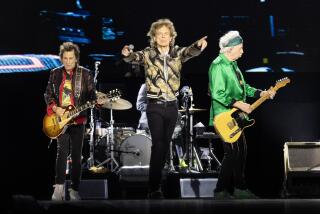Bowie Just one of the Boys in High-Powered Tin Machine
- Share via
Tin Machine’s show Thursday at the Hollywood Palladium was persuasive evidence that it is possible for a star of the caliber and charisma of David Bowie to submerge himself in the machinations of a traditional rock ‘n’ roll band--previous depositions from Paul McCartney & Wings, Todd Rundgren’s Utopia and others to the contrary.
The return of the Tin White Duke in the non-theatrical guise of T-shirted lead singer for just another loud quartet strikes some as yet one more chameleon pose in a decades-long string of them. And not without good reason. When fellows of a certain age who’ve delved into every rock genre decide to simply let it rip, there’s an element of calculation that isn’t present when kids 25 years their junior face the same noisy brashness as an inevitability, not a decision.
Then again, so what? Tin Machine, which has no pretensions toward an especially youthful image, also presents a convincing case that reckless abandon in playing isn’t synonymous with youthful zeal. There’s a knowing maturity here--a dignity and a seasoned-ness--that doesn’t spoil but rather manages to somehow complement the roughhouse nature of the thing.
Thursday night’s show was anything but a star turn for Bowie, and not just because drummer Hunt Sales and bassist Tony Sales got to sing two token numbers each, or because Bowie was unduly humbling himself in the service of band democracy. Rather, the quartet sounded like an honest unit committed to kicking each other’s musical rears while staying in tight step. Even their songs sound like true band compositions, rather than Bowie numbers trussed up for rawness’ sake (with the occasional exception of something like “Baby Universal,” which would’ve sounded at home on “Ziggy Stardust”).
Besides one of the hardest-hitting rhythm sections in show business, Tin Machine also has a guitar hero to speak of in Reeves Gabrels, whose fluid runs and pleasingly grating squeals are almost a summation of the attributes of past Bowie sidemen, from studio-seasoned Earl Slick to flipped-out Robert Fripp--encompassing classic blues and chaos in pretty much the same breath. If and when their front man returns to solo-act status, it’s almost hard to imagine that he wouldn’t be a bore without them.
That said, Thursday’s show had its share of imperfections--the odd pacing, for starters. For whatever reason, the band opted to focus on slow or mid-tempo numbers for most of the early part of the set, and by the half-hour point--when Sales was singing an overextended version of his straight-ahead blues “Stateside”--was in danger of losing momentum entirely. A Doors-like, meandering stretch in the middle of the otherwise exemplary “Heaven’s in Here” could’ve easily been done without. And the amount of in-jokes traded between members between songs was somewhat off-putting to us, the excluded audience.
One element that wasn’t a minus was the expected complete lack of selections from Bowie’s solo career, the only non-Tin Machine numbers being Roxy Music’s “If There Is Something” and the Pixies’ “Debaser,” both highlights. Indeed, at times the band almost sounds more influenced by the aggressively offbeat chord progressions of the Pixies than by, say, classic David Bowie. But it’s far from outrightly emulative. Rather than just one more appropriation of a persona by Bowie, this seems like the real rock ‘n’ roll thing. When he moves on to the next thing, we’ll be sorry to have been wrong.
More to Read
The biggest entertainment stories
Get our big stories about Hollywood, film, television, music, arts, culture and more right in your inbox as soon as they publish.
You may occasionally receive promotional content from the Los Angeles Times.










